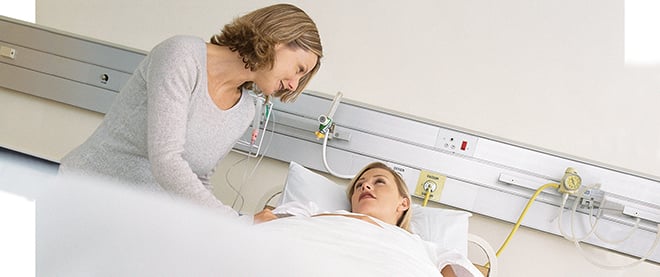What not to say when a friend becomes seriously ill
How to comfort the afflicted — the right way
Vincent Hazat/Getty Images
Share

It may not have been the book that readers of Ms. magazine expected Letty Cottin Pogrebin to write. A founding editor of Ms., Pogrebin is better known for exploring gender issues in books like How to Make It In a Man’s World. But her experience of having breast cancer at age 70 showed her how unsure people are of how to behave when confronted with illness or loss. In How to Be a Friend to a Friend Who Is Sick, Pogrebin gives practical advice drawn from that experience as well as from sick people she’s interviewed.
On the list of what not to say is what one friend said to Marian Fontana, who was diagnosed with breast cancer eight years after her firefighter husband was killed at the World Trade Center. The friend exclaimed, “Wow, you must have really bad karma!”
But according to Pogrebin, one of the most basic conversational openers, “How are you?” can just as easily upset sick people. Some feel as though they can’t be normal until their friends stop pelting them with portentous “how are yous.” One woman with cancer said that the three-word question struck her as an invitation to confide the worst. “Rather than see me as me, the asker viewed me as a cancer victim!” A better option is, “It’s good to see you today,” suggests Pogrebin. Or, if you do ask, “How are you?” follow it with, “I know that’s not a great question but I really do want to know.” Then be prepared to listen attentively and know that some sick people may describe their condition graphically. “Let them talk about whatever they want. It’s not going to kill you to hear about their bowel movements. Bear in mind that what strikes you as oversharing may constitute the entirety of your sick friend’s reality.”
The language around illness can be fraught. Not all patients are comfortable with military metaphors, according to Pogrebin, who flags words like “fight,” “battle” and “survivor.” She’d never given thought to cancer’s appropriation of war-speak until several of her hospital waiting-room cohorts complained that the violent images militated against their yearning for inner peace. One patient told Pogrebin that the word “remission” sounds like a combination of “retreat” and “submission,” which together suggest that her cancer is hiding in a trench somewhere, waiting to pop out.
When a sick friend talks about her illness, picture and remember the details. One woman was furious when a friend asked for a recommendation on where to get a mammogram. “I don’t get mammograms anymore! I haven’t had breasts in years! I’ve had two mastectomies!” She couldn’t believe her friend could forget. And don’t minimize the diagnosis by saying something like, “Nowadays having breast cancer is like having a cold.” The two purest words of sympathy Pogrebin heard were from her friend Kathleen. “When I told her I had cancer, her reaction both summed up her empathy and captured my feelings in a nutshell. She said, ‘Oh, f–k!’ ”
Seldom do people who are ill want their condition to be the primary focus of conversation. “If they want to talk about other things, please comply,” writes Pogrebin.
If someone has survived a suicide attempt, be sensitive to their embarrassment but don’t beat around the bush. “He knows that you know why his wrists are bandaged,” she writes. “Take the bull by the horns and ask if they feel like talking about it,” she suggests.
Ask how you can help, if your friend is at home. Offer to walk the dog or weed the garden. “For my money, the grand prize for most restorative gift goes, hands down, to marijuana,” writes Pogrebin, citing an op-ed article in the New York Times in which a judge, Gustin Rechbach, who has pancreatic cancer, outed himself as a user. How did he get the illicit drug? “With a little help from his friends,” she writes.
If you’re the one who’s sick, don’t keep it a secret, she advises. Pogrebin tried to contain the news of her diagnosis to 12 friends. The plan backfired. To those she didn’t tell, “I may as well have said, ‘You’re unworthy of my confidence.’ ” Worse, by withholding her diagnosis, she may have conveyed the impression her cancer was more serious than it was. “Tell more, not fewer people from the get-go, and you’ll end up with less explaining to do.”